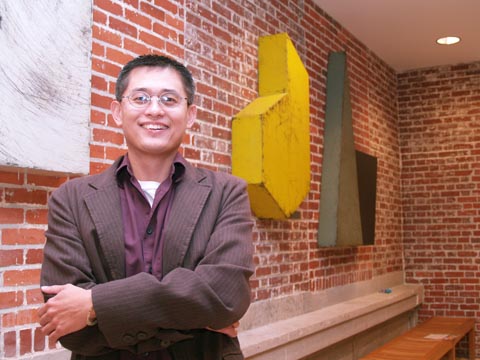| |
|
|

from the issue of October 4, 2007
|

| |
|
|
| |
Soh fine-tunes software that helps monitor, enhance student learning

BY TROY FEDDERSON, UNIVERSITY COMMUNICATIONS
Leen-Kiat Soh's hard drive is home to a few extra classroom monitors this semester.


 
| | I-MINDS CREATOR - Leen-Kiat Soh, an associate professor of computer sciences and engineering, is developing I-MINDS, a software program that monitors student learning. Soh uses I-MINDS data to pair students by area of expertise and to guide areas of focus for classroom lectures. Photo by Troy Fedderson/University Communications.

| |
For the fifth time in three years, the assistant professor of computer science and engineering has deployed I-MINDS, a software program he is developing to monitor and enhance student learning.

"I-MINDS is not about building software to replace the classroom teacher," Soh said. "One-to-one instruction remains very important. But, when you have a large classroom of 200 or more students, those interactions are impossible.

"The I-MINDS software can make this possible."

Integrating the software into the syllabus, Soh assigns an I-MINDS software agent to each student at the beginning of the semester. The agent - which can be accessed via the Internet - profiles each student's behavior and exchanges the information with other student agents and a teacher agent.

The agents use the information to pair students by area of expertise. Soh also uses the data in the classroom, pointing out areas where students need to improve and directing lectures to areas of need.

"We actually place a better student with one who is less successful, forming a team," Soh said. "They work together. The better student learns by teaching. The other student learns from the added insight of his or her partner."

The software also learns from working with individual students, storing information for future inquiries. If an individual agent does not know the answer to a question, it can pose it to the other agents in the class. It can also request the information from the teacher agent.

The teacher agent supplies Soh with a list of topics based on the questions posed by the student agents. Soh can then use this information to guide classroom discussions.

And, by dividing the students into groups, the I-MINDS software can track how individual students interact with each other, gauging the individual input into the group project.

"When peer-based learning is utilized, there is more discussion among the peers," Soh said. "Studies have shown that these types of interactions improve learning in the classroom. This software facilitates peer-based learning."

The program also mimics communication trends popular among new students.

"The world is changing," Soh said. "When I was a kid and you wanted to talk to someone, you walked over to their house. Now, everyone has a cell phone and is texting each other.

"Communication has become so collaborative. This is a trend that is not going away. And, I-MINDS utilizes that trend to improve learning."

Soh has deployed versions of I-MINDS five times - three times in the Introduction to Computer Science course, once in the J.D. Edwards Honors Program's Computer Science I class, and this semester in his Multiagent Systems course.

Soh has continued to work bugs out of the software. He also worked on the development of the program's ability to connect via wireless systems while used in the J.D. Edwards Honors Program.

"We want to make sure we have all the bugs worked out before we offer I-MINDS on a wider basis," Soh said. "We have found a few more bugs this semester, but we are fixing them and it should be very stable at that point.

"I think, after one more year of development, that we'll be ready to go."

While the program has the potential to improve classroom education, Soh has also received a positive response from industry officials.

"I've talked to a few companies and they are excited about using I-MINDS as a corporate training tool," Soh said. "They are very excited about the program's ability to work in group assignments. It could be very effective for managers."

For Soh, the project is exciting for two reasons - his major research interest is in multiagent systems like I-MINDS, and he has always strived to improve his classroom teaching.

"When I came to UNL, I really wanted to do something that impacts education," Soh said. "I thought why not do something that I am familiar with. As it turns out, it was quite complex. And, it's still not perfect, but we're getting closer."

Soh's I-MINDS research has been supported by grants from the National Center for Information Technology in Education, the National Science Foundation, the Department of Computer Science and Engineering, Undergraduate Creative Activities and Research Experiences, and Microsoft.
GO TO: ISSUE OF OCTOBER 4
NEWS HEADLINES FOR OCTOBER 4
Soh fine-tunes software that helps monitor, enhance student learning
Ari plight topic for Oct. 11 'Academic Freedom' lecture
Fankhauser trades cigarettes for running shoes
Health risk survey available until Oct. 12
Scarlet available in pdf format
Chancellor issues Campus Wellness Program update
Couple to serve on ANDRILL teams
Psych training program outlined in journal article
Q & A with David Harwood
Researchers seek climate change 'Rosetta Stone'
Trip offers first-hand experience to students
732953S37357X
|
|
|
|
|
|
|
|